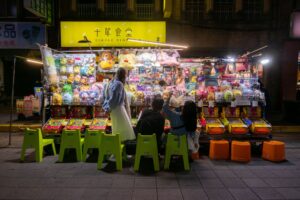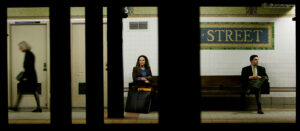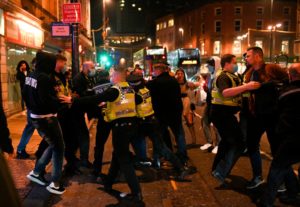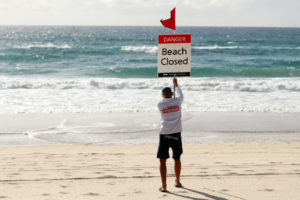The Thursday before Christmas, I woke up in downtown Sofia, leisurely drank a coffee, and jumped on a metro that took me directly to the airport. In less than an hour, I was at the gate for my flight to New York’s JFK. My plan was to get the last bus upstate that evening, so I could be in my own bed a little after midnight. But it would only work if the flight landed on time — and if passport control took under an hour and a half.
The first happened, but the second didn’t even come close. To describe Terminal One that Thursday night as a shitshow is unfair to shitshows, which are at least darkly entertaining. This was bureaucratic hell: lines of exhausted travellers snaking out into dreary linoleum hallways festooned with disconcertingly cheery posters welcoming us to NYC. It took close to an hour to even reach the main hall, and then we endured another hour of slow shuffling up to the 10 or so border security agents.
Ever since I began my project to walk around the world, it has always been jarring to come home to the US, often from much poorer countries — in this case Bulgaria — to find that our infrastructure is infinitely worse. Of course, flying internationally is still a luxury, and complaining about it is a bit elitist. I really wish the US, and JFK in particular, would make an effort to meet global standards of air travel — but it was what happened after I left the airport that convinced me that America, and especially NYC, is broken.
After crashing at a friend’s house not far from JFK, I got up to take a 4:39am subway train to the Port Authority bus terminal in Manhattan, so I could catch the first bus home. The train, to be fair, was on time. But it was filthy. The carriages were mostly empty, except for three or four homeless guys in each who were either sleeping or passed-out. The dozen or so of us who got on at the first stop chose our seats carefully, positioning ourselves close to each other, for safety, and as far as possible from the sprawled-out guys and their piles of trash and puddles of urine.
The train slowly filled at each subsequent stop, until it was standing room only. I was seemingly the only person on the train who didn’t have to be there. Ride a NYC subway from the outer boroughs at 4am and you’ll find that it’s jammed with overnight construction workers, office cleaners, nannies, restaurant staff, hotel employees — all coming from late shifts, or going to early shifts, carrying tool bags, hard hats, work clothes. The “help” coming in and out of the city. United in fatigue and quiet frustration with the squalor, with the unconscious men taking up multiple seats.
I thought about Sofia, where the subways and buses — and other public spaces and resources — are so much cleaner, safer, and smoother. Where workers simply wanting to get to their jobs don’t have to deal with navigating the mentally ill, addicted and desperate every day. For context, the GDP of Manhattan alone is about nine times that of the entire nation of Bulgaria. But NYC’s problems only seem to be getting worse, especially for those who have the least. I don’t have to take the subway; I have the cash for an Uber. But I try to see, and to understand a little, the world as most people see and understand the world.
And what I see is that, in the US, larger cities are basically two-tiered. A wealthy downtown professional class relies on inexpensive labourers who can’t afford to live near their workplace or drive a car; who are forced into long commutes on public transport systems in terminal decline.
Eventually, that morning, a guy covered in old vomit and carrying a cane, his trousers only just above his knees, got onto the subway train, and went up and down each carriage, hitting every sleeping or passed-out guy on the legs, yelling at them to move on, to give the rest of us some space. Everyone else pretended it wasn’t happening, hoping it wouldn’t go south, focusing instead on the floor or their phones.
And nothing “bad” did happen, beyond a few raised voices and some pantomime air punches. We all got where we needed to go.
But having garbage-strewn subways that effectively serve as mobile homeless shelters is no way to run a public transit system. It isn’t fair on the riders who don’t have the money to avoid the subway. It also isn’t fair to the homeless, who are being encouraged — or at least not discouraged — to hang out on crowded trains, maximising the chances that bad stuff will happen. The Daniel Penny-Jordan Neely case was a horrifying example. The death, on Sunday, of a man who tried to break up a fight on a Manhattan-bound subway train may be another. NYC’s authorities, even if they tried, couldn’t design a better system to provoke a nasty backlash against addiction, mental illness and homelessness.
But this isn’t just an East Coast problem. Last May, city officials in Los Angeles proudly announced a new kind of bus stop to address rider complaints by providing “shade and lighting”. They called in La Sombrita — and were promptly and roundly mocked by Twitter users, who pointed out that it’s a sad provider of both light and shade. I mean, just look at it. At best it provides shade for one person, maybe. As for the light, I’m not sure how it is any different from your standard streetlamp?
And then there was the expense. It was claimed that each La Sombrita came to $10,000, although the research that went into designing it is said to have cost well over $300,000. That process included junkets to foreign cities, to see what works, including Quito in Ecuador, a city I’ve spent a fair amount of time in. I can tell you, Quito doesn’t have these sad things.
I’m not saying LA shouldn’t be doing something about bus stops. While the city has a surprisingly extensive system, with clean and comfortable buses, the stops themselves can be pretty terrible: a pole by the side of a road under an underpass that reeks of urine, or a simple bench in the glaring sun. But that they came up with La Sombrita as the solution — and announced it so proudly — is depressing, and another revealing example of America’s much bigger problem: its inability to build nice things.
One of the forces that influenced LA authorities, though they won’t admit it, is homelessness. They built La Sombrita, rather than a proper bus shelter, for the same reason NYC is taking benches out of Port Authority: they don’t want people to sleep there. It’s something you see more and more in American cities: a locking down of public spaces in an attempt to deal with the growth of the homeless population. A removal of resources for the majority, because of concerns over “misuse” by less than 1% of residents.
I’m not saying those concerns aren’t well-founded. Benches become unusable if someone is sleeping or pissing on them. But removing them is a cowardly way to cope with a problem that authorities are otherwise not wanting, or able, to address.
To get big-brained about it, something like La Sombrita could only happen in a high-regulation/low-trust society like the US. If regulations massively limit both bottom-up and top-down solutions, and if those solutions are expected to protect against all sorts of bad behaviour, you end up building the least to mitigate the worst — building things the majority doesn’t want, or doesn’t find useful.
The high-regulation part of the US is usually couched in the language of safety, but it’s really about not allowing organic growth, which is messy — even though, people being people, it tends to result in things the majority really wants. Ecuador, by contrast, is a low-regulation (although low-trust) society: here, you get ad hoc, bottom-up solutions. If there is a bus stop in the middle of nowhere, without natural shade around it, riders rig an umbrella to a pole, or throw some old seats under a tree. In the US, such solutions would be dismantled within days.
But also, in places like Quito, bus stops attract street vendors, who come with umbrellas, making people feel safer by their very presence. LA has some of that, but it’s against the letter of the law, and vendors are constantly hassled with fines, or threats of shutdowns. My favourite taco place was closed down twice during my short stint in LA, for bureaucratic reasons. All this is to say that in Quito getting the bus is a much more pleasant experience than in LA — even though the latter city is roughly 10 times richer than Ecuador, and the latter has its own serious troubles.
Regulations themselves aren’t the problem, though. Germany, like much of northern Europe, is a high-regulation society, but it’s also high-trust, compared to the US. Here, nice and fully functional things are built without fear of misuse. For Americans, who have both a high-regulation and low-trust society, this is all rather depressing; it’s the combination that means we can’t have nice things.
I like to live here, but the reality is we are rapidly falling behind the rest of the world in liveability, especially when you adjust for our wealth. Our cities are being frozen in time by an absurd, centralised regulatory mindset, which sees human flourishing as dirty and unsafe, and seems determined to wring out the last drops of any soul from our urban spaces. A mindset that manifests as one useless La Sombrita at a time.
It’s not that I’m worried about Americans moving overseas. That’s a luxury most don’t have — or want. I’m worried that authorities don’t feel compelled to provide citizens with towns and cities that work, and feel safe, and offer slivers of shade and corners that don’t smell of piss. But I’m also worried about the cultural forces that have got us here: that they allow the tolerably well-off to ignore the plight of those who are forced to depend on public services. The regulatory mindset is a problem that can be easily changed; the more pernicious part is that we are now firmly a low-trust society, and social trust impacts everything — every facet of life — and it can’t simply be legislated back. Like a ratchet wheel, once social trust comes undone, it spins quickly out of control, and getting it wound back is a long, arduous, and complex process.
I wish we could stop it from spinning too much further out of control, but I’m not particularly hopeful. The first step would be to realise that something is wrong, and right now a lot of people in the US seem determined to deny we have a problem. Why complain, when you can just order an Uber to avoid the subway?
Disclaimer
Some of the posts we share are controversial and we do not necessarily agree with them in the whole extend. Sometimes we agree with the content or part of it but we do not agree with the narration or language. Nevertheless we find them somehow interesting, valuable and/or informative or we share them, because we strongly believe in freedom of speech, free press and journalism. We strongly encourage you to have a critical approach to all the content, do your own research and analysis to build your own opinion.
We would be glad to have your feedback.
Source: UnHerd Read the original article here: https://unherd.com/





